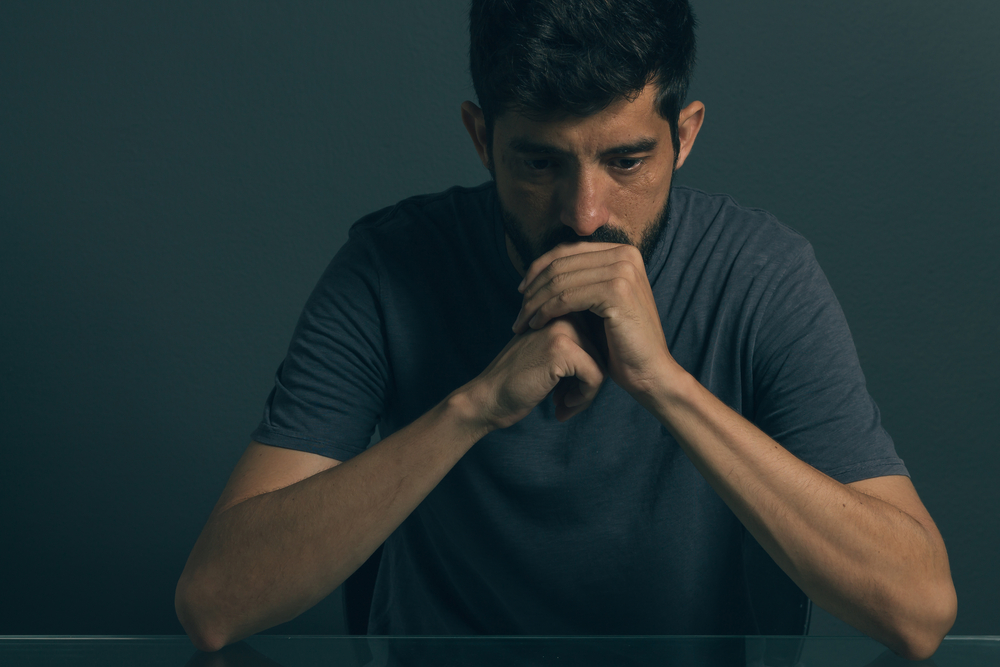Let’s talk about something that probably keeps you up at night (even though you try to pretend it doesn’t). The fear of dying is totally normal, but when it starts messing with your daily life? That’s when it becomes a problem. Here’s how to spot if your death anxiety has gone from healthy awareness to unhealthy obsession—and what you can do about it.
1. You Can’t Watch Medical Shows Anymore

Remember when Grey’s Anatomy was your favorite show? Now you can’t watch it without thinking every symptom matches something you might have. Medical dramas, news stories about illnesses, or even casual conversations about health send you into a spiral of worry. You find yourself changing the channel or leaving the room when these topics come up. It’s like your brain has become a WebMD search gone wrong. The fix? Start small—try watching short clips of medical shows when you’re feeling calm and grounded. Work with a therapist to develop exposure therapy techniques that feel manageable. Eventually, you can build up a tolerance.
2. Every Body Sensation Feels Life-Threatening

That random chest pain? Must be a heart attack. Headache? Definitely a brain tumor. You turn every minor body sensation into a potential death sentence. Your doctor probably knows you by name because you’re there so often, checking out symptoms that turn out to be nothing. The relief from getting the all-clear only lasts a few days before the cycle starts again. Here’s what helps: Start keeping a symptom diary to track patterns and triggers. Often you’ll notice your “symptoms” correlate with stress or anxiety. Working with both a doctor you trust and a mental health professional can help you distinguish between real health concerns and anxiety-induced sensations.
3. You’re Obsessed With Health Headlines

Your browser history looks like a medical journal because you’re constantly googling the latest health threats. Every news story about a rare disease becomes your new obsession. You’ve downloaded every health app available and check your vital signs multiple times a day. Sometimes you find yourself reading medical studies at 3 AM, convinced you’ve found your next potential diagnosis. The solution? Set strict limits on health-related googling—maybe 15 minutes once a week for legitimate health questions only. Unsubscribe from health news alerts and delete those tracking apps. Instead, channel that energy into reliable annual check-ups with healthcare providers you trust.
4. You Avoid “Risky” Activities

Flying? Nope. Roller coasters? No way. Even driving makes you anxious because you’re constantly thinking about accident statistics. You’ve started limiting your activities more and more, always choosing the “safe” option. What used to be fun now feels like a game of Russian roulette, and you’re sitting out more adventures than you’re living. Time to reclaim your joy—start with small challenges like short drives or mild thrill rides. Use mindfulness techniques to stay present instead of playing worst-case scenarios in your head. Remember: the biggest risk is letting fear steal your experiences.
5. Bedtime Has Become Dread Time

Nighttime is when your death anxiety really kicks into high gear. You lie awake wondering if you’ll wake up in the morning, checking your pulse, or listening to your breathing. Sleep has become your enemy instead of your friend. You might even avoid going to bed until you’re completely exhausted, just to skip those anxious thoughts in the dark. Combat this by creating a calming bedtime routine—no phones, gentle stretching, relaxing music, and maybe some meditation. Write down your anxious thoughts before bed to get them out of your head. If you wake up anxious, try the 5-4-3-2-1 grounding technique: name five things you can see, four you can touch, three things you can hear, two things you can smell, and one thing you can taste.
6. You’re Planning Everything Way Too Far Ahead

Your need for control has turned into overdrive. You’ve got multiple life insurance policies, a detailed will (even though you’re 25), and emergency plans for every scenario imaginable. While some planning is smart, you’re taking it to extremes. You can’t enjoy today because you’re too busy preparing for every possible tomorrow. The fix? Work with a financial advisor or estate planner who can tell you what’s actually necessary for your age and situation. Then, challenge yourself to focus on planning something fun instead—like a vacation or hobby project. Balance preparation with present-moment living.
7. Physical Symptoms Keep Popping Up

Your fear isn’t just mental—it’s showing up in your body too. Panic attacks, racing heart, sweating, and dizziness hit you whenever death-related thoughts creep in. The irony? These anxiety symptoms often mimic the health problems you’re afraid of, creating a nasty cycle. Your body’s fight-or-flight response is stuck in the “on” position. Learning to recognize these as anxiety symptoms is key—practice deep breathing exercises and progressive muscle relaxation.
8. You’re Overly Protective of Loved Ones

Your anxiety doesn’t stop with you—it extends to everyone you care about. You blow up their phones if they’re a few minutes late, make them text you when they arrive anywhere, and freak out if they don’t answer immediately. Your love has turned into helicopter parenting, even with adults. Everyone’s starting to feel smothered by your constant checking. Start loosening the reins gradually—set reasonable check-in times and trust your loved ones’ judgment. Channel that protective energy into quality time together instead of constant monitoring.
9. You’ve Developed Ritualistic Behaviors

Maybe you check your pulse a certain number of times before bed, or you have to read medical reassurance articles in a specific order. You’ve developed rituals you think will keep death away. These behaviors have become like a security blanket—irrational but hard to let go of. The way forward? Work with a therapist who specializes in OCD-like behaviors. They can help you gradually reduce these rituals while developing healthier coping mechanisms. Start by delaying the ritual for a few minutes, then longer periods, proving to yourself that anxiety will pass without the behavior.
10. Social Media Makes It Worse

Every RIP post sends you into a spiral, especially if the person was young or died unexpectedly. You find yourself calculating ages, comparing lifestyles, and looking for warnings you might have missed in your own life. You’ve probably muted words like “died” and “passed away” on your social feeds, but you still can’t help checking death announcements. Take control by doing a social media detox—unfollow news pages that trigger you, limit your scrolling time, and fill your feed with life-affirming content instead. Better yet, spend that time connecting with friends in real life.
11. You’re Avoiding Doctor Visits

This one’s tricky because it seems opposite to hypochondria, but it’s actually related. You’re terrified of getting bad news, so you avoid check-ups altogether. Better not to know, right? Regular screenings and preventive care have become your worst nightmare because you’re afraid they’ll find something. Break this cycle by finding a doctor you really trust—interview several if needed. Start with a simple check-up, bringing a supportive friend if needed. Remember: early detection is your friend, not your enemy.
12. Future Plans Feel Pointless

Making long-term plans feels impossible because you’re convinced you won’t be around to see them through. You struggle to commit to future events or make big life decisions because death anxiety is clouding your vision of the future. Challenge this by starting small—buy tickets to a concert a few months away or plan a trip for next year. Each time you follow through on a future plan, you prove your anxiety wrong. Keep a “future joy” journal of things you’re looking forward to.
13. You See Omens Everywhere

Black cats, broken mirrors, certain numbers—you’ve become hyper-aware of anything that might be a “sign.” Your rational brain knows these are just superstitions, but your anxiety brain catalogs every coincidence as a potential warning. Time to get logical—start keeping track of these “omens” and their outcomes. You’ll see there’s no correlation. Practice challenging these thoughts with facts and probability. Work with a therapist on cognitive restructuring techniques to break these thought patterns.
14. You’ve Lost Interest in Long-Term Goals

What’s the point of career advancement, saving for retirement, or working on long-term projects if you’re convinced you won’t be around? Your anxiety is stealing your future by making you live like you don’t have one. Flip the script by setting one small, achievable goal each month. As you accomplish these, gradually extend your planning horizon. Consider working with a career counselor or life coach who can help you reconnect with your ambitions.
15. Life Feels Like a Ticking Clock

You’re constantly aware of time passing, but not in a healthy “seize the day” way. Every birthday feels like a countdown, and age milestones become anxiety triggers. Transform this mindset by celebrating time differently—start birthday traditions that focus on achievements and gratitude rather than numbers. Practice mindfulness to stay in the present moment. Create a bucket list that excites rather than terrifies you.
16. Normal Life Changes Feel Catastrophic

Grey hair, wrinkles, or normal signs of aging send you into a panic because they remind you of mortality. Even positive changes like your kids growing up or career advancement make you anxious because they mark time passing. Challenge yourself to reframe these changes as signs of a life well-lived. Start a gratitude journal focusing on what each life stage brings rather than takes away. Join groups or communities of people embracing similar life stages with joy and wisdom.








